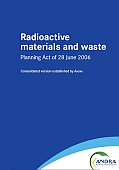French legal framework
The history of Andra has been marked by numerous changes in the law. Initially attached to the CEA, then known as the French Atomic Energy Commission, the legislative authorities decided in 1991 that Andra should become an independent agency. Over the years, Parliament has given Andra ever greater responsibilities, making it a frontrunner in radioactive waste management.
The "waste" law
The law of 28 June 2006 on the sustainable management of radioactive materials and waste complements the law of 30 December 1991 on research into the management of radioactive waste known as the "Bataille" law.
Among the main provisions, the law:
- provides for the development of a national plan for the management of radioactive materials and waste, updated every 3 years;
- sets the new timetable for research on high-level and long-lived intermediate level waste. The law specifies that the three lines of research provided by the "Battle" law (deep geological disposal, transmutation and long term surface storage) are complementary but considers that the reversible storage in deep geological formation is the reference solution;
- provides for the establishment of an inventory every three years of radioactive materials and waste present in France
- defines the obligations that will be imposed on nuclear operators as regards provisions for the financing of radioactive waste management and decommissioning. The waste producers will themselves have to provide the sums required for long-term financing;
- also provides for strengthening evaluation procedures, public information and consultation. In particular, the law provides for consultation steps (public debate, including with local authorities, public inquiry) necessary before the authorization of deep geologic radioactive waste disposal is issued;
- increases the role of ANDRA by attributing to it a public service mission for the management of radioactive waste for which the person in charge is in default;
- prohibits the permanent storage on French soil of foreign waste by providing for the adoption of rules specifying the conditions for the return of waste resulting from the treatment of spent fuel or waste from abroad treated in France.
The 2016 Law on reversibility and governance

Act of 2016 Articles of the Planning Act N°. 2006-739 of 28 June 2006 Concerning the Sustainable Management of Radioactive Materials and Waste modifying the Environmental Code
Thanks to Act No. 2016-1015 of 25 July 2016, setting out the conditions for constructing a reversible facility for the disposal of high-level and intermediate-level long-lived radioactive waste in a deep geological formation, many of the concerns expressed during the public debate held in 2013 became established under French law. The Act defines the concept of reversibility and sets an agenda for regular public meetings to discuss governance of the project.
The EC "Waste" directive
Directive 2011/70 / Euratom establishing a Community framework for the responsible and safe management of spent fuel and radioactive waste was adopted on 19 July 2011 by the Council of the European Union. It is transposed into internal law in the code of the environment.
This directive establishes a binding framework and requires Member States to adopt a national policy for the management of spent fuel and waste, based in particular on the following principles:
- polluter pays, with ultimate responsibility from the Member State for radioactive waste produced in its territory,
- minimizing the volume and harmfulness of the radioactive waste produced,
- protection of human health, safety and the environment,
- storage in the country where they were produced, except in the case of a bilateral agreement defined according to the conditions of the Directive.
The directive also requires the establishment of a legislative framework and a national program to implement, in accordance with a graduated approach to risk levels, a waste and spent fuel management policy. This program, based on a national inventory, must cover all waste, from production to long-term management, and be periodically reviewed and notified to the European Commission.
The directive also requires the establishment in each Member State of a competent regulatory authority in the field of radioactive waste and spent fuel management safety, with the necessary financial and human resources to carry out its missions. It sets safety requirements and calls for the establishment of an authorization system for waste and spent fuel facilities. It also obliges license holders to devote sufficient financial and human resources to waste management.
The directive also requires that the necessary information on the management of spent fuel and radioactive waste be made available to the public.
Finally, the directive imposes regular self-assessments of the national framework, relevant regulatory authorities, as well as the national program and its implementation, supplemented by an international peer review.

